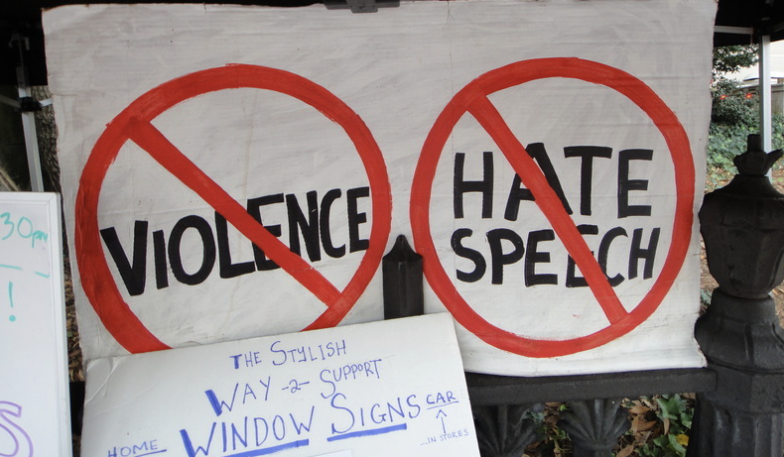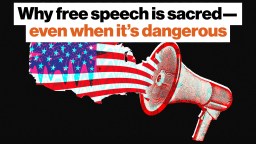Speech is violence? Not if we want a liberal, intellectual society

- Speech that is offensive, hateful, or harshly critical is often classified as “violence” by people who seek compensation from or punishment for the offender.
- But the impulse to punish people who offend is a regressive urge, one that necessarily chips away at intellectual freedom.
- Abandoning intellectual liberalism puts our very freedom at risk.
In 1989, the novelist Salman Rushdie went into hiding. The supreme leader of Iran, Ayatollah Ruhollah Khomeini, had issued a fatwā calling on “all valiant Muslims wherever they may be in the world” to kill the writer without delay, for which the assassin would receive a bounty of $1 million.
Rushdie’s offense was writing a novel. Called the Satanic Verses, the story depicted the prophet Muhammad (and his wives) in ways that incensed parts of the Muslim community and turned the author into the world’s most infamous heretic. As the story circulated through international media, Western intellectuals often offered muddled responses.
Of course it was wrong for Khomeini to call for the murder of a novelist who had merely written a book, most agreed. But few liberal-minded commentators seemed eager to say Rushdie was entirely without fault. The Indian-born writer had, after all, deeply offended the religious beliefs of millions of Muslims, in nations where values like piety and respect for authority had long been deemed more important than free expression.
The controversy highlighted the longstanding philosophical chasm between the Islamic and Western worlds: fundamentalism versus liberalism. But for the journalist and author Jonathan Rauch, the most revealing part of the Rushdie affair was not the cultural clash of values. It was the failure of Western critics to understand the nature of their own liberal intellectual system.
“People often did not seem even to know what it was — free speech? religious liberty? nonviolence? respect for other cultures? — that they were defending,” Rauch wrote in his 1993 book Kindly Inquisitors: New Threats to Free Thought.
What many people failed to understand, and therefore failed to defend, is an unpleasant fact of intellectual liberalism: When speech causes emotional or mental pain, the offended parties are morally entitled to nothing in the form of compensation from or punishment for the offender.
There is, to put it baldly, no right not to be offended. To be sure, that doesn’t mean that deliberately offending people for its own sake is morally acceptable, or that people should be entitled to use speech to incite violence, harass, or threaten. Rather, it means that the impulse to punish people who offend is a regressive urge, one that necessarily chips away at intellectual freedom, even if the punishers do not wield legal authority. Rauch outlined the reasoning:
“If [the offenders] cannot be put in jail, then they should lose their jobs, be subjected to organized campaigns of vilification, be made to apologize, be pressed to recant. If government cannot do the punishing, then private institutions and pressure groups — thought vigilantes, in effect — should do it.”
This tactic leads not to progress, according to Rauch, but to inquisition.
Kindly Inquisitors
In Kindly Inquisitors, Rauch described a problem that every society in human history has faced: How do groups of people best decide who is right? Every person, after all, is fallible, biased, and can only know so much. To answer the question, societies have followed a variety of principles that have helped them reach consensus and produce knowledge.
Rauch outlined five of those principles:
- Fundamentalist principle: Those who know the truth decide who is right.
- Simple egalitarian principle: All sincere persons’ beliefs have equal claims to respect.
- Radical egalitarian principle: Like the simple egalitarian principle, but the beliefs of persons in historically oppressed classes or groups get special consideration.
- Humanitarian principle: Any of the above, but with the condition that the first priority be to cause no harm.
- Liberal principle: All beliefs must be kept in check through public criticism, the only legitimate way to decide who is right.
The liberal principle, according to Rauch, is the only acceptable one. It reliably leads groups of people to establish accurate knowledge of the world through the decentralized process of falsification. (The liberal principle also has the benefit of minimizing conflicts. Under, say, fundamentalism, there is no fact-checking the supreme leader; there is only silence or coup.)
In other words, intellectual liberalism allows anybody to express themselves and pursue knowledge in the public sphere by proposing their ideas and criticizing other ideas. Rauch called this process liberal science. Why science? It borrows two key rules from the scientific process:
- No one gets the final say: you may claim that a statement is established as knowledge only if it is falsifiable, in principle, and only insofar as it withstands attempts to debunk it.
- No one has personal authority: you may claim that a statement has been established as knowledge only insofar as the method used to check it gives the same result regardless of the identity of the checker or source of the statement.
One advantage of liberal science is that it functions like evolution: The good ideas tend to survive, while the bad ones fade away over time. Liberal science is also similar to two other decentralized systems: democracy (political) and capitalism (economic). Like those systems, liberal science is imperfect and often painful; the production of knowledge can be a zero-sum game in which some people are wrong, and their ideas, opinions, or beliefs get marginalized.
However, the other principles of pursuing knowledge are far more likely to lead people away from truth and toward conflict, according to Rauch. For the vast majority of history, human societies were ruled by kings, tyrants, and religious leaders whose fundamentalist claim on truth was dangerous to challenge. Later, in the 20th century, the egalitarian principle guided totalitarian regimes like the Soviet Union to eliminate any counter-revolutionary messages and their messengers.
Kindly Inquisitors made the case that what is most threatening to modern intellectual liberalism is a subtler principle, one that often stems from compassion but wreaks havoc in application.
The humanitarian principle
In the Rushdie affair, the aspirational assassins were following the humanitarian principle, which goes something like: It is generally fine to pursue knowledge and express yourself until you cause harm.
This compassionate instinct might seem noble at first, but it leads to a regressive imperative.
“Its strong moral traction tugs at anyone who cares about others, and it has a wonderful moral clarity: Thou shall not hurt with words,” Rauch wrote. “That precept looks harmless, even admirable. Yet as the concern not to offend ascended the ethical scale from good manners to social imperative, a long-familiar side effect was ascending with it, like a childhood nightmare returning to haunt the adult: if hurting people with words is wrong, then the people who commit the offense must be called to account.”

Three decades after the Rushdie affair, you do not need to look far for examples of offended people claiming to have been harmed by words. But the only thing new about this phenomenon is the volume. The Roman Catholic Church considered the idea of heliocentricity to be harmful in the 16th century; the same with evolution three centuries later. In the 1940s and 1950s, the Second Red Scare deemed pro-communist writing and speech to be so dangerous to the point of treason. And in the 1970s, some Americans crusaded against pornography, arguing that it constituted violence against women.
Whenever speech or ideas are categorized as violence, akin to physical assault, an inevitable conclusion emerges: something must be done.
But is offensive speech really violence? The answer is a megaphoned yes to some people, like the student activists who protested the right-wing troll Milo Yiannopoulos’ 2017 speaking event at UC Berkeley: “[A]sking people to maintain peaceful dialogue with those who legitimately do not think their lives matter is a violent act,” read one op-ed published in The Daily Californian.
This usage of “violent” might seem like it’s stretching the common definition of the word to the point of unrecognizability. But the protestors’ argument contained some truth. Few people, after all, would claim that words are completely incapable of causing harm. Despite the “sticks and stones” adage, it is not difficult to imagine a hypothetical situation where a loved one says something so emotionally devastating that a jab to the jaw seems far less painful.
Words can hurt, even if only “feelings.” But the key is that words harm in ways that are fundamentally different than assaults in the physical world.
The objective and subjective “harms” caused by speech
Everyone intuitively understands there is some distinction between hurtful words and hurtful actions. In 2017, however, the psychologist Lisa Feldman Barrett blurred those differences by adding a new layer to the “words wound” argument. In an opinion piece published by The New York Times called “When Is Speech Violence?”, Barrett wrote:
“Words can have a powerful effect on your nervous system. Certain types of adversity, even those involving no physical contact, can make you sick, alter your brain — even kill neurons — and shorten your life.
“Your body’s immune system includes little proteins called proinflammatory cytokines that cause inflammation when you’re physically injured. Under certain conditions, however, these cytokines themselves can cause physical illness. What are those conditions? One of them is chronic stress.”
Barrett proposed a causal link between speech and physiological harm. However, she did not claim that just any type of speech causes harm.
“Offensiveness is not bad for your body and brain,” she wrote. “Your nervous system evolved to withstand periodic bouts of stress, such as fleeing from a tiger, taking a punch or encountering an odious idea in a university lecture.”
Still, Barrett said there is a difference between speech that is offensive and abusive. The latter, according to her, includes things like our “hateful” political climate and “rampant bullying in school or on social media,” all of which can damage our nervous system because they can spark “long stretches of simmering stress.”
This opened the door for an argument from the humanitarian principle.
“That’s why it’s reasonable, scientifically speaking, not to allow a provocateur and hatemonger like Milo Yiannopoulos to speak at your school,” she wrote. “He is part of something noxious, a campaign of abuse. There is nothing to be gained from debating him, for debate is not what he is offering.”
Barrett was probably right to characterize Yiannopoulos as a noxious provocateur and hatemonger. What’s more, there is no doubt that spending a lot of time in a toxic environment — say, an overtly sexist workplace — can produce chronic stress and, consequently, negative health outcomes.
But Barrett’s suggestion that “abusive” speech is violence — and, therefore, science says we should not give platforms to certain people — starts falling apart when you consider the subjective ways in which people interpret speech.
Consider these statements:
- Jesus is not the son of God.
- All nonbelievers are evil and going to hell.
- Pornography is morally acceptable.
- Women should be forced to wear hijabs.
- American veterans who fought in Iraq are war criminals.
- The detainees at Guantánamo Bay deserved to be tortured.
- Capitalism is inherently exploitative, and all wealthy people are morally compromised.
- Communism is an evil, totalitarian ideology that killed millions of people.
You could conjure up reasons why any one of these statements is “harmful” or even — if you expose yourself to them long enough — “abusive.” Does that make them so? Maybe for you, but not necessarily for everyone.
This is one key difference between hurtful words and hurtful actions: Words and ideas strike the minds of individuals in infinitely unique ways; the receiver interprets them through their own cognitive filter that developed from factors like life experience, temperament, and maturity. In contrast, physical violence is an uncomplicated, universal offender. A punch to the face hurts everyone.
In her opinion piece, Barrett raised valid points about how speech and ideas can cause damaging stress. But ultimately, the so-called “scientific” policy of categorizing speech as violence yields the same prescription proffered by so many people before her: something must be done.
“[W]e must also halt speech that bullies and torments,” she concluded. “From the perspective of our brain cells, the latter is literally a form of violence.”
A false choice
Language is always evolving, and words do not always need to be tethered to their denotative meaning for us to understand what people mean. But classifying speech as violence and treating it as such pretends as if the harms caused by words and physical actions are equivalent, despite fundamental differences between the two that even children understand. The classification demands that offenders be punished, leaving people with two options: speak in ways that hurt people with words or in ways that don’t.
Under the humanitarian principle, it is easy to determine what to do with offenders: shut them down through official or unofficial force. But the impossible question is who is going to do it? In nations where millions of people hold diverse beliefs, who gets to decide exactly when speech becomes “harmful” and which people should be protected from offensive or critical speech? Any move to establish an authority, official or unofficial, to rule over these questions is a move toward authoritarianism and away from intellectual liberalism, a system which simultaneously makes space for ugly ideas but also those which have given rise to civil rights, secularism, and the bulk of modern scientific achievements.
Some people might argue that intellectual liberalism — or liberal science, or whatever you want to call it — is just an abstraction. Why waste time talking about abstractions when real people are suffering as a result of harmful speech or dangerous ideas? To Rauch, liberal science might be an abstraction, but the consequences of abandoning it are concrete, whether it’s the Catholic Church’s Inquisition, the Red Scare, or the seven-figure bounty that remains on Salman Rushdie’s head today.
“The false choice presented by humanitarians is between wounding people with words and not wounding people with words,” he wrote. “The real choice is between hurtful words and billy clubs, jail cells, or worse. If you think that the right to offend is a mere ‘abstraction,’ ask Rushdie.”
So, what should be done when speech “harms”?
“When we do become offended, as we all will, we must settle for responding with criticism or contempt, and stop short of demanding that the offender be punished or required to make restitution,” Rauch wrote. “If you are unwilling to shoulder that obligation, if you insist on punishing people who say or believe ‘hurtful’ things (as opposed to telling them why they are wrong, or just ignoring them) then you cannot fairly expect to share in the peace, freedom, and problem-solving success that liberal science is uniquely able to provide; indeed, you are putting those very benefits at risk.”





